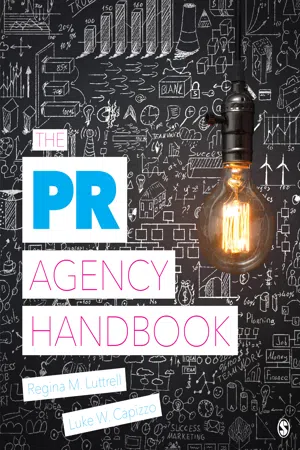![]()
Part 1 Agency Life
![]()
Chapter 1 Working in an Agency
“Welcome. We’re thrilled to have you here. I hope you like coffee.”
Objectives
- Clarify the characteristics of agency public relations work as opposed to in-house work.
- Understand the difference between niche and full-service agencies.
- Define the practitioner roles within a public relations agency.
- Introduce the benefits and challenges of agency careers.
These words, or something to their effect, have been shared with generations of practitioners beginning their careers at a public relations (PR) agency. While these individuals, the clients, and even the core skills needed to perform this work can be dynamic in nature, much of the agency experience is universal. Agencies can be a great place to build a career on the leading edge of the PR industry.
Agencies attract whip-smart, motivated individuals. They are often people who are not satisfied with punching a clock and performing work that is considered “good enough.” The archetypal agency individual is a driven multitasker, someone who wants to be involved in every part of a process. Smart leaders hire the grown-up version of the kid who did everyone else’s work on group projects in elementary school—and stayed up late to ensure that every last magazine cutout was glued correctly to the poster board.
PR agencies offer a path to responsibility for young practitioners. They provide both the opportunity for and responsibility of counseling clients. The bar for success may be high, but so are the possibilities—both personally and professionally.
Working with a team of these Type-A personalities can be challenging and stressful, but it can also be incredibly productive and rewarding. It has provided a nurturing, motivating, and positive place for many young PR professionals to learn and grow in their careers. Yet, without the right support structures or the necessary personal motivation, agency life can also leave many budding practitioners tired and burned out after only a short time. In order to increase the probability of success, individuals should approach agency life with an open mind in order to understand and appreciate the unique demands and rewards of the environment—and with the understanding that it isn’t for everyone.
It’s also critical to remember that not all agencies are created equal. There are big and small companies and well-established and brand-new firms as well as those that are well-run and those that are less so. Even within these categories, some agencies are the right fit for the right person at a certain time in their careers but not at others. The difference between the right firm and the wrong firm for you can be night and day, so it’s critical to be aware of the characteristics that define them.
If these traits, environments, and opportunities speak to you, this text can provide a window into the world of balancing the agency- and client-focused work needed to succeed. Working with leading agency professionals and serving a variety of clients is engaging, invigorating, challenging and rewarding work … that is, if you enjoy working hard and learn to appreciate the value of strong coffee.
Elnur Amikishiyev / Alamy Stock Photo
Work Environment
You wake up. You make yourself look presentable and check your calendar to see if you have any meetings with more buttoned-down clients that day. You check email. You check your media alerts. You scan your client’s social media channels and notifications. If nothing caught fire overnight, you make your way in to the office. You email two clients about stories that went live that morning—thankfully both positive. If you have a moment to breathe, you make a list of eight tasks you should accomplish that day and star five of them that need to be done. You get started on one of the items but are quickly distracted when a partner at your firm lets you know that he needs your help for an urgent client proposal. This puts you behind in preparing for a client call that afternoon, but you’re still able to distribute a press release and provide the competitor research results needed for the proposal. By the time you wrap up the client call, make some reporter follow-up calls, and take care of an unexpected—but positive—media inquiry requiring client outreach and compiling talking points as well as the draft of an internal agency report, you realize that you’ve accomplished an incredible amount of work, but only one-third of it was on your original to-do list!
They may not have federal government-level benefits, a Google-style cafeteria, or Wall Street bonuses, but PR agencies tend to be some of the more fun, engaging, and rewarding places to work in the marketing and communication field.
Tip
In-House Public Relations or Agency Life?
One key distinction to keep in mind between an in-house PR position and that of an agency job is the size, skill, and makeup of your department. At many small companies, the communication/marketing/PR department may only be one or two people. Even recent graduates can quickly find themselves as the top communicator within this type of organization. While this responsibility can also have its rewards, it may not offer the opportunities to learn from and work alongside top industry professionals. Additionally, in very large companies, the responsibility of communication is often so segmented that junior practitioners end up with a very narrow exposure and skill set. While the opportunities for advancement may be exceptional over the long term, seniority often plays a larger role in the advancement process.
Many PR agencies have earned a reputation for supporting a youthful office environment with many junior professionals, providing numerous opportunities for recent college graduates. In part, agencies attract young professionals because they are fast-paced, vibrant places to learn. They can also offer rapid advancement opportunities and the potential for increased responsibility early in a practitioner’s career.
Of course, there is another side to those same opportunities: PR firms are inherently high-pressure, no-excuse environments. Agencies ask a lot from all members of a team. They tend to hire a significant number of recent graduates due to a heightened level of attrition. Many young professionals in this industry have very high expectations placed upon them by senior staff, and the training, credit, and compensation do not always match these expectations. That said, these high expectations are precisely why well-run agencies attract top talent.
PR agencies provide a multitude of experiences and opportunities for young professionals.
©iStockphoto.com/XiXinXing
Whatever the circumstances, the formula for success is usually straightforward: Work hard, show results for your clients, and support the agency team. At most firms, those who do this well are rewarded, and those who do not eventually look to move on. In an era of gold stars and participation trophies, this can be a rude awakening. Either way, working at a PR agency can be an intensely rewarding experience, especially knowing that the work one does is impactful, valued, and rewarded.
Long-term career success requires exposure to a variety of experiences and skills and the subsequent refinement of them. PR agencies can facilitate this process as well as, if not better than, any other type of organization due to the dynamic nature of the business.
Expectations
While every PR agency environment is unique due to the leadership, geography, client base, and a multitude of other factors, the following list highlights a few of the key expectations that all incoming practitioners would be well served to work toward. Think of these as adjectives that describe the ideal agency professional.
Effective
One of the most rewarding parts of agency life is working with a group of people who are singularly focused on execution by collectively working diligently toward their personal, agency, and client goals. It’s not simply the volume of work and the amount of time it takes to complete that work; prioritization, focus, and delivering on expectations are all essential for company success. The most successful agency team members are equally effective at executing both internal and external projects and are conscientious in their work with both fellow agency peers and client partners.
Efficient
Agency professionals are expected to work hard and be efficient. The structure of an agency, built on the professional services model, means that clients are generally not paying a la carte for specific deliverables but for professional time to complete the desired services. To oversimplify, it means that the faster a junior team member can write a strong press release, the more valuable he or she to the agency. That said, success is also determined by the results or outcomes of a specific project, rather than only the outputs,1 as explained in the leading measurement guidelines described in the Barcelona Principles. Therefore, writing a press release that takes twice as long but gets picked up by three times as many media outlets is more valuable in the long run. Ultimately, it’s about doing impactful work that fulfills a client’s business objectives.
Empowered
Life in an agency world is all about finding solutions. Top agency leaders cultivate strong teams by giving them important responsibilities and empowering them to make decisions and work toward a goal. They allow their teams to make choices—and, occasionally, mistakes—as part of the learning process. By providing their team members with the responsibility to plan and execute increasingly larger swaths of client work, agency practitioners build skills and confidence while increasing the sense of personal ownership and investment. This means that individuals must be willing to take on the responsibility and burden of driving client campaigns forward to success.
Energized
Effective public relations does not happen by accident. While there is a significant amount of skill necessary in order to be successful in the field, drive, willpower, and energy are also essential to get the job done. In walking through the office door each morning, it’s critical to carry with you the desire to do your best work and a positivity undaunted by the obstacles placed in your way. Confidence and energy are critical for any PR practitioner, but the agency professional requires more of both—whether it’s to help convince a hesitating client that a thoughtful strategic approach is right for them or to get through a to-do list made extra-long by multiple client projects.
One of the more rewarding aspects of a well-run agency is that each of these traits is developed and cultivated during the life cycle and proper execution of integrated marketing communication (IMC) campaigns.
PR agencies value professionalism and personality, since the percentage of public, external-facing, or client-facing team members is generally higher than at most organizations. This means that one’s ability to look, sound, and perform in a professional manner is critical from the first day of hire. To be an active and valuable participant in meetings, one needs to be prepared, flexible, confident, and able to think on one’s feet.
None of these skills are developed overnight, but they are cultivated through observation of senior professionals in action; development of depth related to a client’s businesses, objectives, and industries; and understanding the process of producing news and content.
Agency Structure
As noted previously, PR agencies come in all shapes and sizes—from boutique firms with 3 to 5 practitioners to massive organizations with multiple offices and hundreds of employees. Nearly all agencies are structured with a top-down (pyramid) hierarchy, with fewer senior executives at the top, vying for new business and setting strategy, and a larger number of junior practitioners ...






